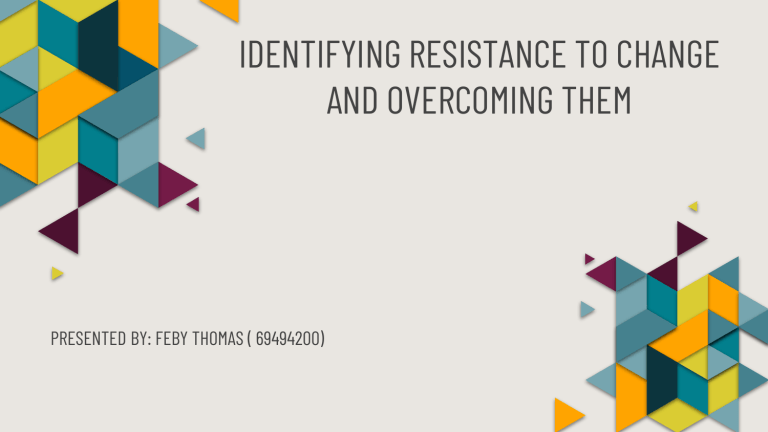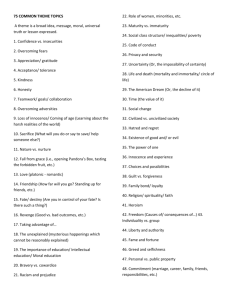Change Management: Identifying & Overcoming Resistance
advertisement

IDENTIFYING RESISTANCE TO CHANGE AND OVERCOMING THEM PRESENTED BY: FEBY THOMAS ( 69494200) TABLE OF CONTENTS 01 INTRODUCTION 02 03 04 THEORIES ON CHANGE MANAGEMNENT IDENTIFYING RESISTANCE TO CHANGE OVERCOMING RESISTANCE TO CHANGE 05 CONCLUSION DEFINITION Change management is the discipline that guides how we prepare, equip and support individuals to successfully adopt change in order to drive organizational success and outcomes. Organizational change management then involves creating a customized plan for ensuring impacted employees receive the awareness, leadership, coaching, and training they need in order to change successfully INTRODUCTION Organisation adopt to change for survival, growth, competitive advantage and so on. Resistance to change is the process of unwillingness to adapt to altered circumstance. Resistance to change is the action taken by individuals and groups when they perceive that a change that is occurring as a threat to them. Employees often respond negatively towards change. THEORIES ON CHANGE MANAGEMENT Three Step Change Model Forces – Field Analysis Theory HOW TO IDENTIFY THE RESISTANCE TO CHANGE a. Blind Resistance Few people are afraid and intolerant of change irrespective of what ever the outcome is. b. Political Resistance Some employee will have the fear of losing their power. For examples: role, positions, base in the organisation. c. Ideological Resistance It means few employees genuinely think change can be fatal to the company OVERCOMING RESISTANCE TO CAHNGE Participation Making people who are affected by change in the organisation effectively participation in the change can causes decrease in the resistance. Use of rewards It includes promotion, feedback, recognition and even monetary incentives. OVERCOMING RESISTANCE TO CAHNGE Leadership The organisation manager should use their moral capability and leadership qualities rather than their power. Negotiation Negotiate employees with base power. OVERCOMING RESISTANCE TO CAHNGE Top Management Support - Facilitative support - Motivation support - Technical support FLOW FOR OVERCOMING CHANGE RESISTANCE CONCLUSION In conclusion, Change leaders are more likely to be successful in their efforts to get others to embrace change if they will themselves demonstrate an ability to embrace resistance to change, To appreciate the positive aspects of resistance and to put those positive aspects of resistance to use in the service of the change being resisted. Finding and analyzing the critical resistance points should always be the primary aspect of any firm considering an organizational change. REFERNCES Jones, G. & George, J. (1998). The Experience and Evolution of Trust: Implications for Cooperation and Teamwork. Academy of Management Review, 23(3), 531-546. Armenakis, A. & Bedeian, A. (1999). Organisational Change: A Review of Theory and Research in the 1990s. Journal of Management, 2(3), 293-315. Bovey, W., & Hede, A. (2001). Resistance to Organisational Change: The Role of Cognitive and Affective Processes. Leadership & Development Journal, 22(8), 372-382. https://www.nickols.us/embracingresistance.com https://www.servicefutures.com/lower-resistance-to-change-when-re-designing-the-workenvironment



